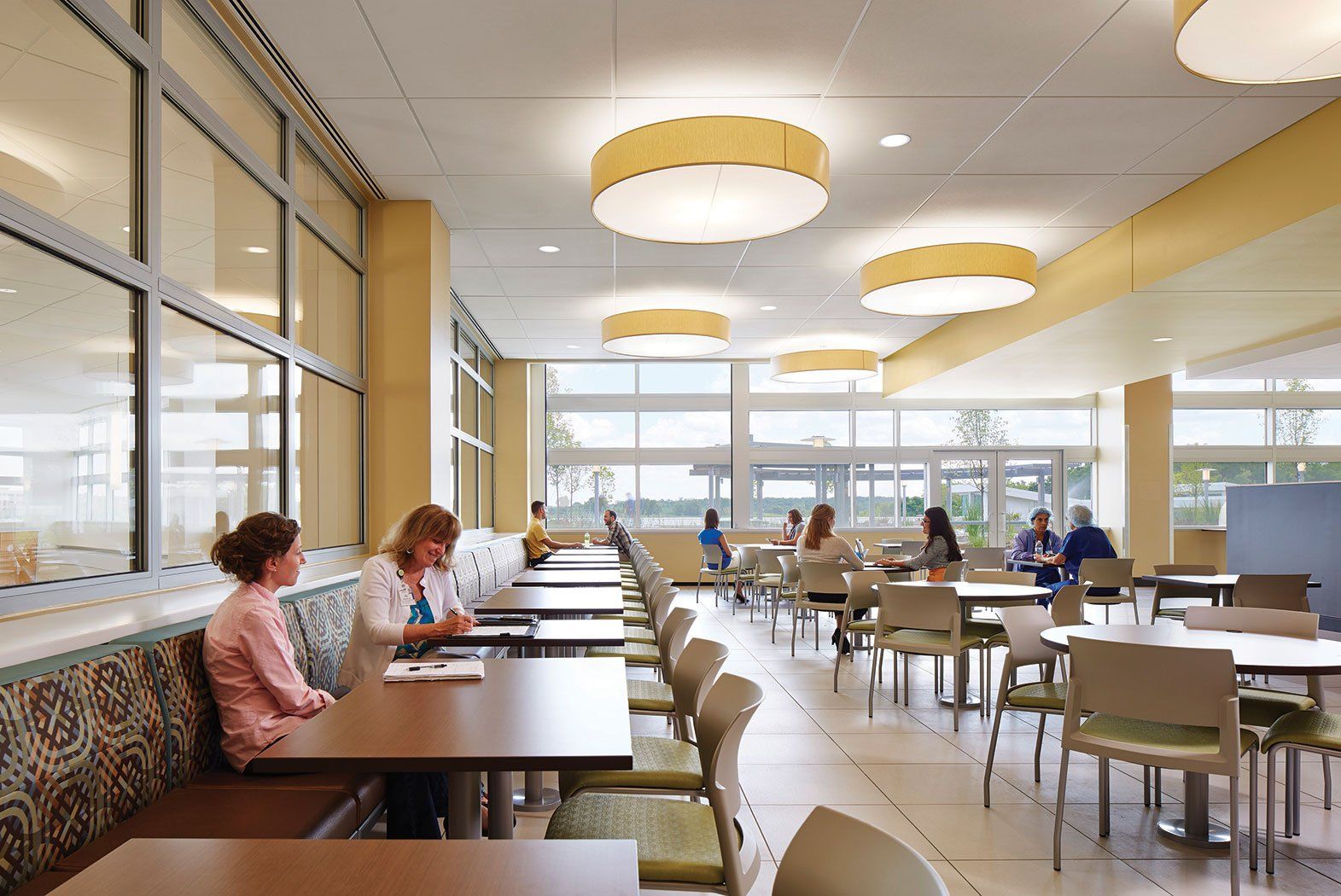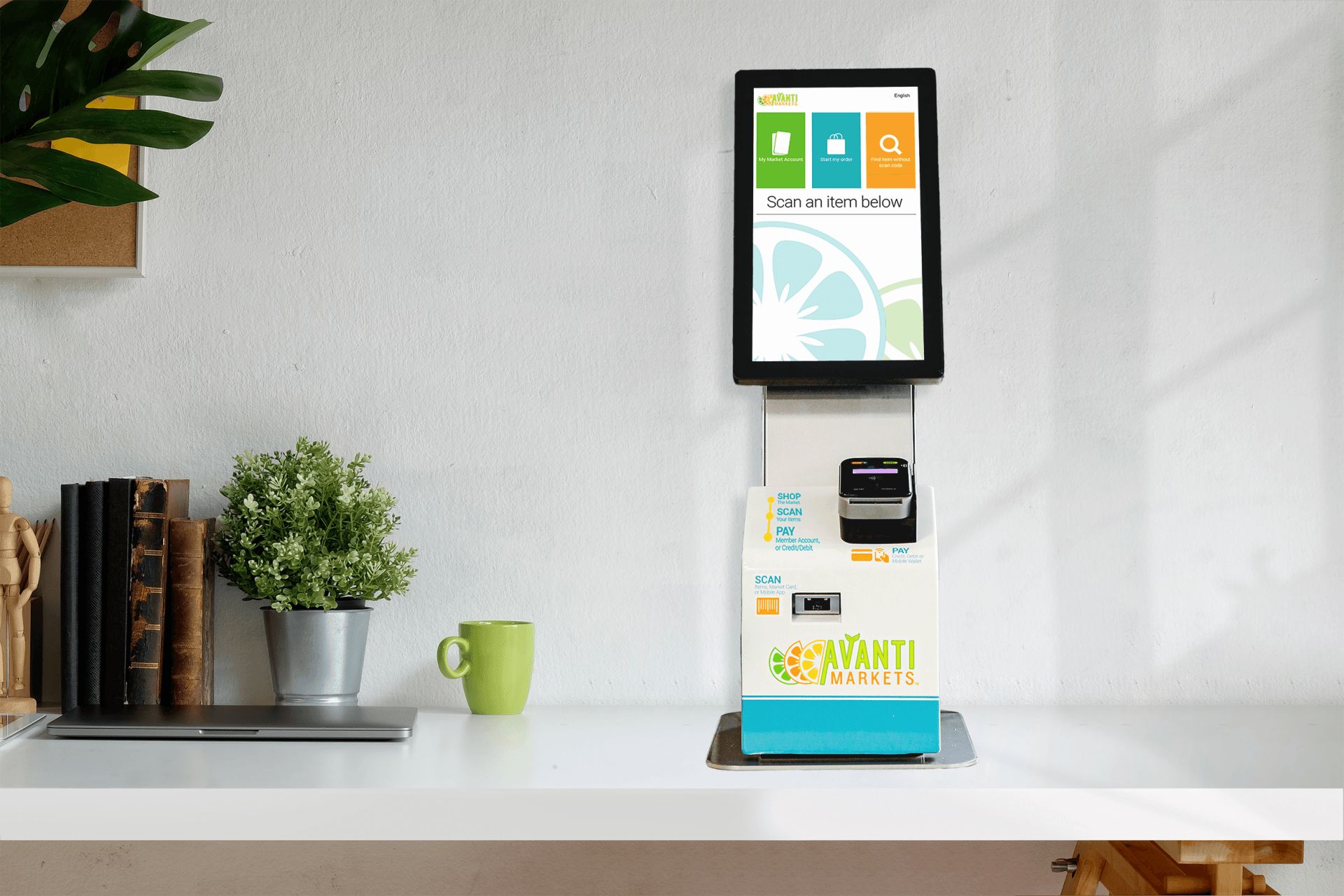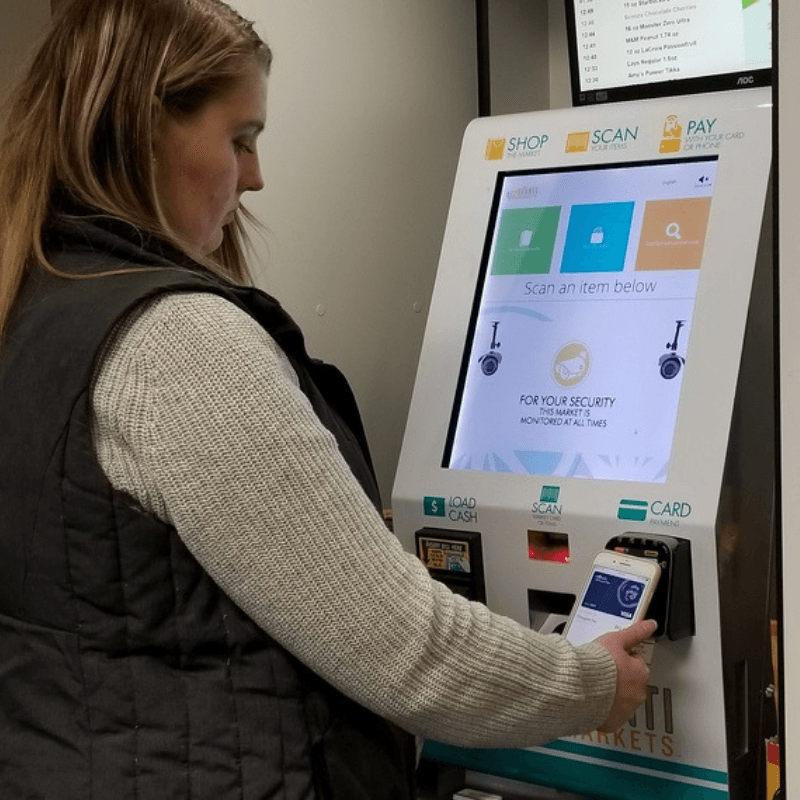The Impact of Covid-19 on Convenience Services
Challenges, Optimism and Flexibility as the Industry Faces These Unprecedented Times
This blog post features excerpts from an article previously published on VendingMarketWatch.com in the “Micro Market Forum” section about how the conversation has shifted given the challenges presented by Covid-19. Click here to read the full article on VendingMarketWatch.com.
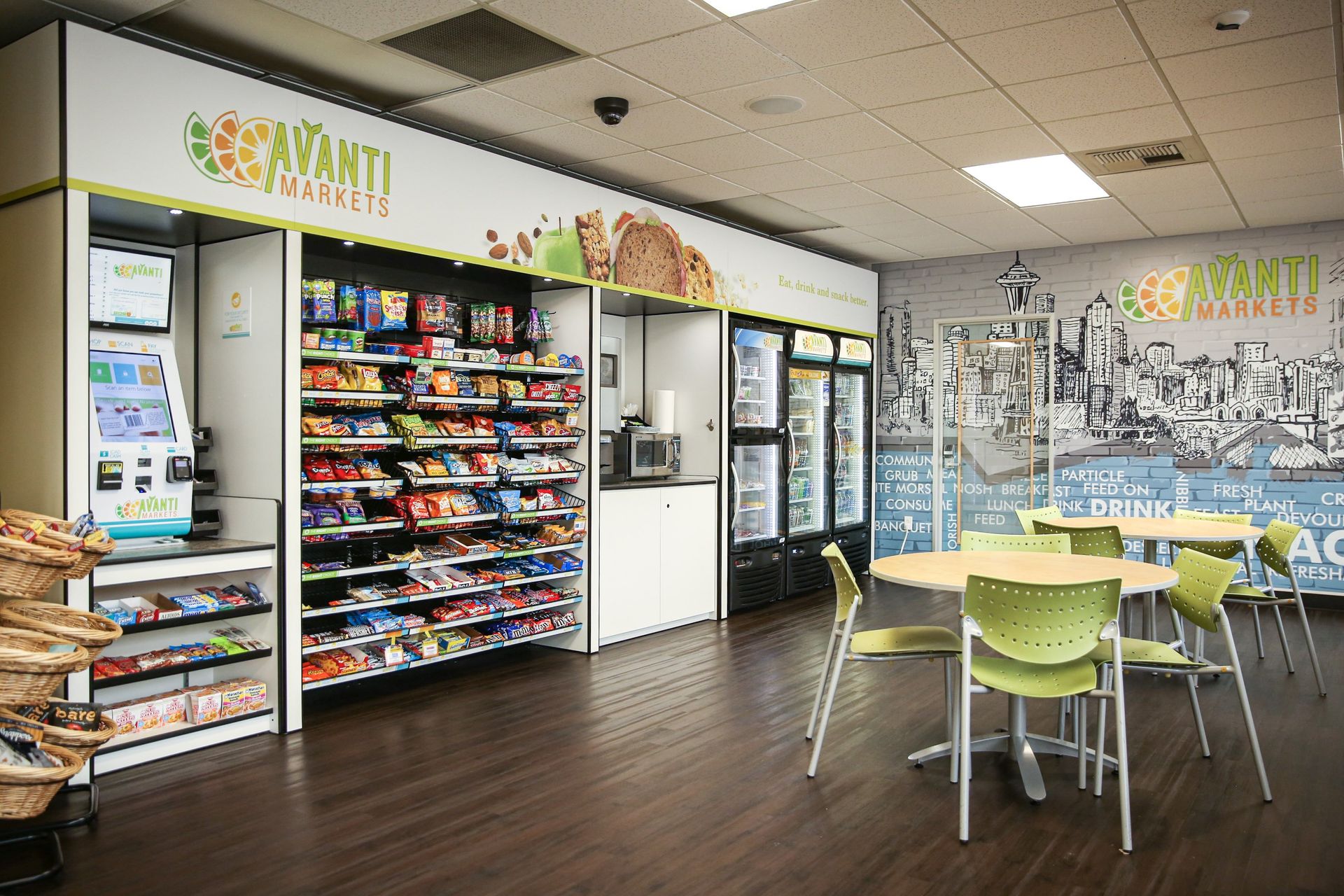
How COVID-19 is Impacting the Micro Market Business
John Reilly, President of Avanti Markets, took some time to chat with Abby White of VendingMarketWatch.com about the changing landscape of unattended retail given the new challenges presented by the Covid-19 pandemic.
“Two months ago, I think micro market operators would have been talking about how to place more markets, improve operating efficiencies, and the next innovation in the space,” said John Reilly, president of Avanti Markets. “Avanti would have been discussing how to position our platform to support our customers’ operations and growth, innovation and frictionless shopping. All that has changed now. Our customers are talking about how to save their business and protect their employees. Avanti is also now intensely focused on keeping our employees safe and employed and our operators in business.
“We are all talking about shelter-in-place, lockdowns and essential businesses,” Reilly continued. “These are things we could not have imagined in January. The impact for all of us is that [as] the at-work environment continues to shrink over the next couple of months, sales will bottom out. How long they will stay down is unknown.
“It is heartbreaking to watch this happen. But markets will recover and that has to keep us going.”
Convenience Services as Essential Businesses
Reilly said that the convenience services industry is taking the lead by pressing on the government to be recognized as an essential business.
“So, in these quarantines, lockdowns and shelter-in-place orders, we still support the food distribution supply chain, which is necessary,” he explained. biggest challenge for us is providing the right kind of support for our customers, and their biggest challenge is surviving all the closing offices.”
Micro markets serve an especially important purpose for essential businesses such as hospitals or distribution centers as they’re often the closest and most convenient place for employees of these essential businesses to purchase food and beverages. Reilly says that operators can best serve their accounts by creating an open and transparent communication platform with their customer base to alleviate any fear about spreading COVID-19.
The Future May Require Some Flexibility
Reilly said that he’s been optimistic about the future of micro markets, and the current slowdown due to the coronavirus pandemic has shifted his focus to helping operators get through this difficult time.
“Before today, we were very optimistic about the market and about growth and expansion,” he said. “It’s really an interesting environment. Now, we’re seeing things happen that we never thought could happen, and there’s a lot more to come — it’s still a very fluid situation.
“I don’t know what’s going to happen in the market space, but we’ll continue to focus on what we can deliver that helps operators. And if they come out of this with fewer at-work environments, then we have solutions for them to grow in a different channel.”
As for what these channels could include, Reilly noted that operators have the capability to expand into rapidly growing areas like contactless delivery, frictionless environments and more public locations.
“We were pretty bullish on the micro market space in our extension into other channels, and I think we’re even more so now as we look to see what happens,” Reilly said. “I think the micro market operators are uniquely positioned to be the last mile suppliers, to run the back office systems and to support the community. I can only talk about Avanti, but we can continue to innovate in the market and bring a frictionless experience to [operators] on the same platform so they don’t have to go and learn a whole different system. We can continue to offer our operator base the tools, the application and functionality to address the changes that the market is going to have. That’s how we can best support them.”
“There has to be an ongoing focus on how to grow your business,” he said. “Where can you get innovative? What new channels can you get into? What new products and services can you offer to the market that will continue to make you relevant and be attractive to the marketplace? If this [coronavirus pandemic] goes longer than we think it’s going to go, let’s keep looking for new channels, new distribution and new applications that you can deploy and use to continue to build the value in your business.”
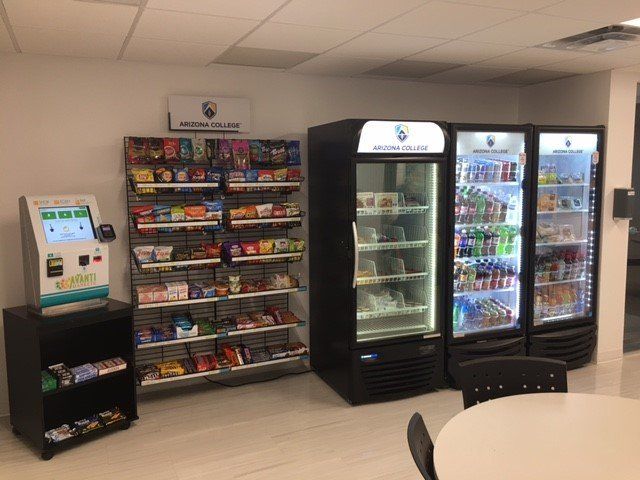
Even before COVID-19 changed the restaurant and retail landscape in 2020, micro markets were growing at a nearly unprecedented rate due to: increasing consumer demand micro market operator earning potential versatility of micro market options underserved markets which represent opportunity for entrepreneurs ever-evolving micro market technology and capabilities Micro market revenues grew nearly $1B between 2016-2019, climbing to a record high $26B in revenues in only two years. We believe there has never been a more exciting time to become a micro market operator , and here are five reasons why, including the benefits of partnering with Avanti Markets on your micro market business. 5 Reasons to Open an Avanti Micro Market Business Right Now 1. Consumer Demand and Preferences The growth of micro markets is not just about the consumer’s demand for food and beverages. Micro markets answer consumer preferences in many areas, especially now in the aftermath of COVID-19 and its impacts to food service. Micro markets answer the consumer’s growing demand for convenience, self-service, and touchless payments, especially among younger consumers (and a younger workforce). Micro market technology enables unattended retail as a food service solution that can be placed in nearly any setting, such as: Office buildings, lobbies, and corporate campuses Colleges, universities, high schools, and other educational institutions Hospitals, medical buildings, medical office parks, etc. Airports, train stations, bus stations, and other commuter facilities Hotels and motels Adjacent to (or in place of) traditional cafeterias Resorts, arenas, stadiums, convention centers, entertainment venues Neighborhood convenience retail locations Automobile service and sales facilities Today’s COVID-19 era consumer also demands food safety and security. Micro markets offer safer, smarter vending solutions where foods and beverages are safely stored, minimally handled, and where inventory can be managed in real time to avoid shortages and respond to demand. The size and type of items which could be dispensed by traditional vending machines limited their ability to satisfy the needs of consumers who are increasingly aware of the benefits of eating healthy. Micro markets and intelligent vending solutions are not constrained in the same way, and so they are able to deliver access to the healthy, fresh foods that consumers want from food service solutions in retail and employment settings.
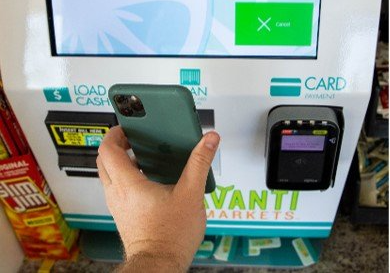
PART 4 OF A SERIES CONTACTLESS OPTIONS FOR THE WORKPLACE - OFFICE COFFEE INCLUDED Contactless shopping is a term we are all hearing a lot lately. It’s one of the strategies being enacted to keep people safe given the impact of the COVID-19 pandemic. But what could that mean for the workplace breakroom? The good news is that companies do have options to help keep their employees safe with contactless options while maintaining office perks such as coffee service or breakroom food options. With the new normal of minimized shared contact points in our everyday lives, the office coffee pot has come under scrutiny. Self-serve pours from the same containers used by virtually all employees no longer feels safe. To combat this, fully contactless coffee solutions are being introduced to the office coffee service landscape. Many convenience service operators are offering coffee programs that limit shared touchpoints to align with consumer expectations. One such example is a bean-to-cup brewer with a software add-on that allows for contactless beverage selection. Users can scan the 2D code on their smartphone and be taken to a mobile interface to make their drink selections. Once selection is completed, the coffee machine will dispense the coffee or hot beverage to the user’s specifications. Companies can use this system to continue to offer free coffee for employees. Or, if they want employees to pay or want to subsidize the cost, the payment can be completed through an associated micro market kiosk. The benefit of a bean-to-cup brewer is that employees can get a fresh, customized cup of coffee at a fraction of the cost of going to the local coffee shop. Not to mention, this way, employees are staying on site to get their coffee instead of traveling to an outside establishment. These are important benefits related to morale and safety of workers. As mentioned, a contactless coffee system can be used in conjunction with a micro market kiosk. An Avanti micro market in your breakroom is another contactless perk not to be overlooked for your facility. Fresh food micro markets offer a variety of fresh, healthy, and in-demand food and beverage items that are likely to keep employees on site for lunch instead of going out to pick up food from a different location.
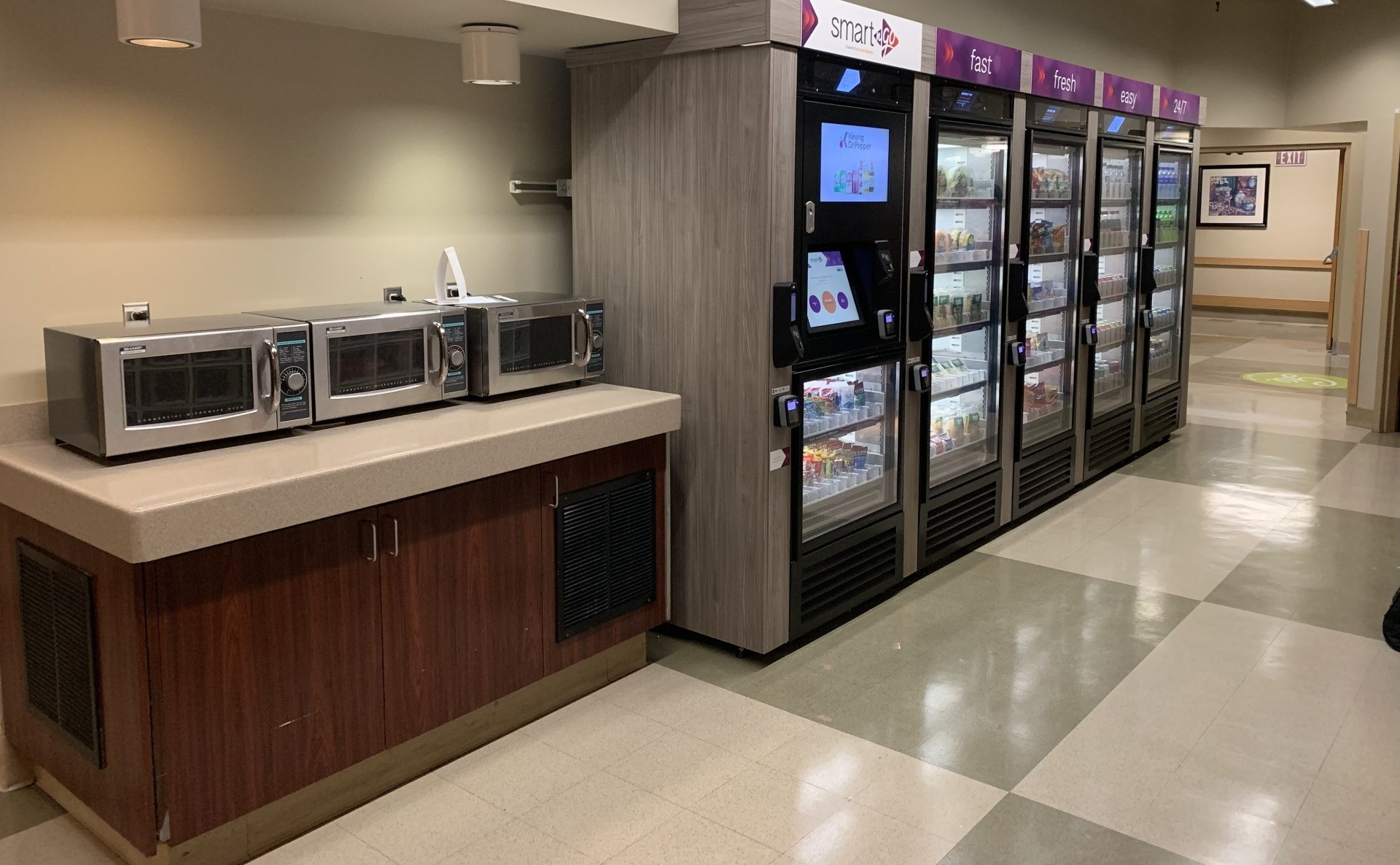
Micro markets are on the grow nationwide. The revenues generated by micro markets increased 99 percent between 2016 and 2018, representing more than $2B in annual sales. While they initially found success in manufacturing businesses and office buildings, micro markets and smart vending solutions have the potential to grow exponentially in other industries as well.
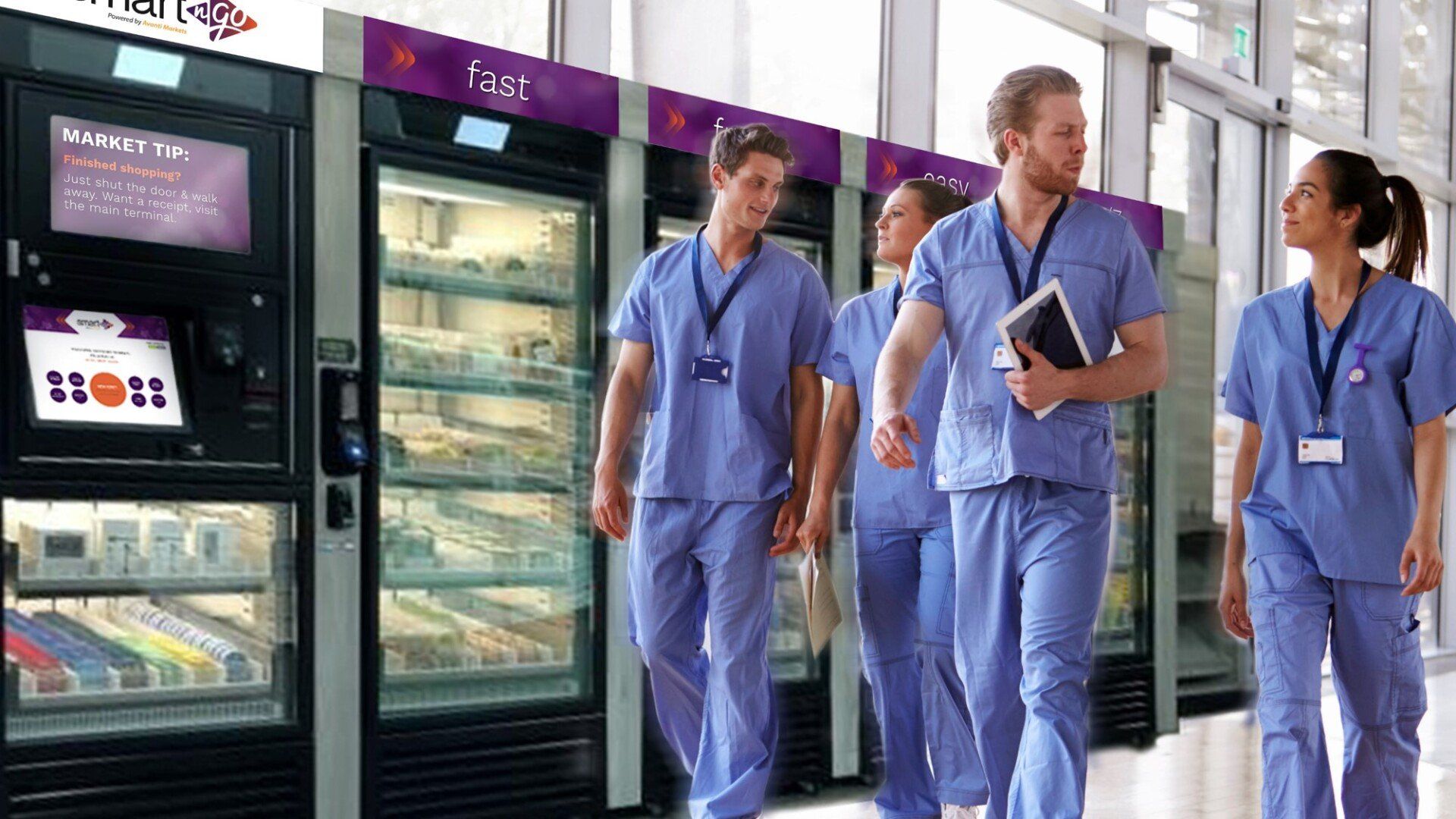
Smart N Go Markets give hospitals and medical facilities a reliable and secure food service solution that is available 24/7. Smart N Go markets are a revolutionary self-service food service alternative that is ideally suited to better serve the needs of hospitals and medical facilities beyond open cafeteria or traditional snack vending. Available at little or no cost to your facility, Smart N Go intelligent vending allows a variety of fresh food, beverages, snacks, coffee and more to be ready to grab 24/7 behind secured glass doors.

7 Benefits of Micro Markets in Light of COVID-19 Prior to the COVID-19 pandemic, micro markets were an emerging trend. These unattended retail establishments began cropping up in offices and apartment building lobbies since 2010 and are especially popular with Millennials and Generation Z. During the pandemic micro markets have evolved from fun novelty conveniences into essential businesses that provide key benefits to the general public and businesses, including the healthcare industry. Here are seven benefits micro markets offer during the COVID-19 pandemic and beyond: 1. No-contact, touch-free transactions 2. Safety and security 3. Provide safe and healthy food options 4. Entice employees back to the office 5. Not affected by labor shortages 6. Versatility and convenience 7. Opportunities to serve underserved markets 1. No-contact, Touch-free Transactions Micro markets are unattended retail spaces and even prior to the advent of the COVID-19 pandemic, they provided customers with a contactless way to purchase healthy food and beverages. Furthermore, micro markets provide added safety in that they offer consumers touchless payment options that can include things like subscription options and payments via an app they can easily download to their smartphone. 2. Safety and Security Micro markets provide the COVID-19 era customer with the added security and food safety they demand. Even fresh produce can be pre-packaged, providing consumers with the added confidence that a piece of fruit, such as an orange or an apple, hasn’t been handled by other people. And for added security, sneeze guards and other plexiglass display options can be installed as well. Additionally, the food and drinks at micro markets have always been safely stored and offered in an easy to access self-service environment where it’s easy for customers to stay socially distanced from each other for added peace of mind. 3. Provide safe and healthy food options According to a recent survey of nearly 1,500 adults, 56 percent of the respondents admitted they found it challenging to eat healthy, in spite of 89 percent also saying that nutrition is important to them. And because micro markets aren’t vending machines but mini one-stop shops, they can provide your customers or employees with healthy snack options in conveniently wrapped and sealed packaging. Furthermore, larger items like sandwiches, salads and fresh produce aren’t a size issue like they are for vending machines that are more limited to less healthy options such as candy or chips.
